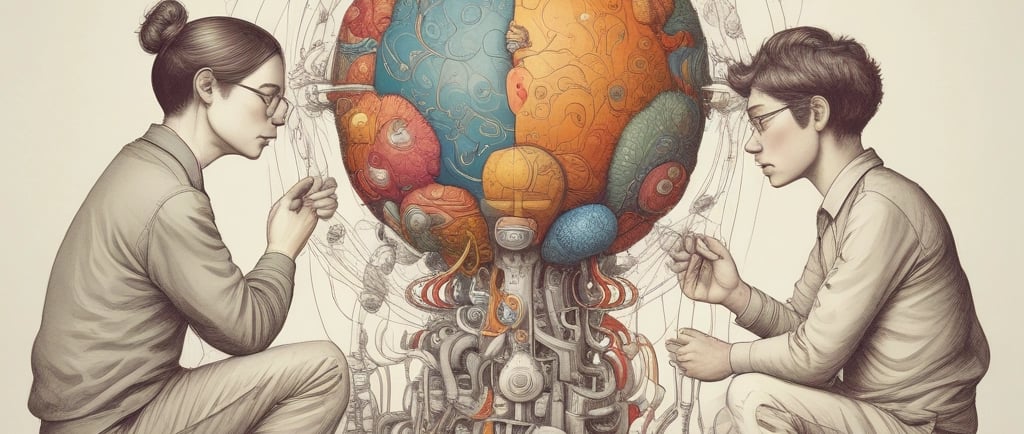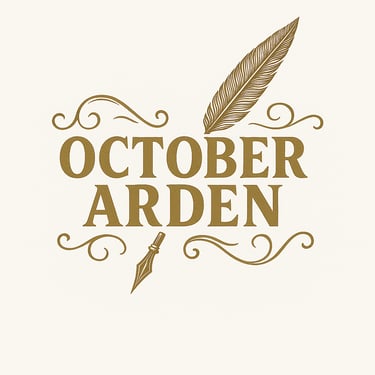The Creative Spectrum: When Characters Become Companions
Exploring the blurred boundaries of plurality and creativity
10/1/20253 min read


The Creative Spectrum: When Characters Become Companions
Writers talk about characters who "write themselves." We nod along, understanding the metaphor.
But what if it's not always a metaphor?
The Truth About My Writers' Room
This entire Inside trilogy exists because Rem and Tiny wouldn't let it go.
When Rem has a story idea, I step back and let him outline it because it's his idea, not mine. When Tiny wants to explore character psychology, she fronts to write because she sees things I miss. When I'm stuck on plot holes, we argue it out—three perspectives, one keyboard, endless debates about what someone would actually say.
It's not like having a muse. It's like having creative partners who happen to live in my head.
A Pattern We Don't Discuss
So here’s the thing: Creative people have been describing plural-adjacent experiences for centuries.
Shakespeare's actors reported feeling "possessed" by his characters, speaking lines that seemed to come from beyond their conscious minds. Virginia Woolf wrote about her characters as autonomous beings with their own desires and resistances. Dickens spoke of his people so vividly that friends would ask after them as if they were mutual acquaintances.
Contemporary authors describe characters who "refuse" to behave, who "wouldn't say that," who seem to have agency independent of their creator's intentions. Toni Morrison spoke of being "taken over" by her characters' voices. Stephen King describes watching his stories unfold as if he's witnessing rather than creating them.
Artists throughout history have described muses, spirits, voices, presences that guided their work. Beethoven claimed his compositions came to him fully formed from an external source. William Blake painted and wrote as if channeling beings from other realms. Joan of Arc heard voices that guided her actions.
We've learned to call these experiences metaphorical. But what if some of them weren't?
What Changed for Me
Having headmates didn't just add creativity to my process—it transformed the entire relationship I have with my work.
When I wanted to quit writing, when publishing felt impossible, when chronic illness made everything seem pointless, I couldn't just give up. These weren't just my stories. They were collaborative efforts, years of shared work that would disappear if I was too afraid to share them.
Rem's ideas deserve to see the world. Tiny's character insights matter. Their creative expression depends on my willingness to be brave for all of us.
It's motivation that comes with genuine responsibility.
Questions I Keep Wondering About
I don't have research to back this up, just observation and lived experience.
But I wonder: What if the "muse" artists have described for millennia was sometimes actual plurality? What if parasocial relationships with fictional characters are a form of temporary, limited plurality? What if the human capacity for deep identification with people who "don't exist" isn't strange—what if it reveals our natural ability to hold multiple consciousnesses?
What if creativity itself can be a pathway to developing headmates?
The Spectrum We Don't Name
I think plurality exists on the most fluid spectrum imaginable. More fluid than gender, more fluid than sexuality, more fluid than anything we've tried to categorize.
Some people connect deeply with fictional characters during specific periods, then move on when that chapter ends. Others carry internal voices throughout their lives. Some have control over when their headmates appear. Others experience them as completely autonomous.
Some systems form from trauma. Others emerge during illness, isolation, or intense creative work. Still others seem to occur naturally.
All of these experiences deserve recognition.
An Invitation
If you're reading this and something resonates—if you've had characters who felt autonomous, fictional friends who seemed real, internal voices that felt distinctly not-you—you're not alone.
You might be discovering something about yourself that doesn't have clean edges or easy explanations. You might be more plural than you realized. Or you might just be human, which has always been more complex than we pretend.
I'm curious:
Have you experienced characters who seemed to write themselves?
Do fictional people sometimes feel more real than actual ones?
What does creativity feel like in your mind?
There's no right answer. Just experience, and the possibility that human consciousness might be stranger and more beautiful than we've been taught to believe.


